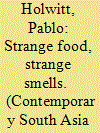| Srl | Item |
| 1 |
ID:
152170


|
|
|
|
|
| Summary/Abstract |
Ever since Expo 2010 was held in Shanghai, the city has been trying to present an image of itself as having the capacity to offer amenities that are more environmentally friendly and that contribute to an improved quality of life. This article aims to show that a locally-enacted facility – far from the much-publicised monumental developments – can constitute a high point of urban activity, an example that contributes to cultivating the sought-after identity of a modern city concerned about the sustainability of its actions. Thanks to a singular grouping of actors from the public, semi-public, and private sectors, the Gubei Pedestrian Promenade (GPP) in the western district of Changning laid the principles of a sustainable urban planning programme ten years before the publication of Shanghai’s New City Plan, resetting the ways for building the city. From today’s perspective, this initiative could be seen as a manifestation of this new way of imagining the city.
|
|
|
|
|
|
|
|
|
|
|
|
|
|
|
|
| 2 |
ID:
158929


|
|
|
|
|
| Summary/Abstract |
This paper inquires into the meaning of food – specifically of food smells – for issues of urban citizenship in the context of urban renewal in Mumbai. The city’s southern neighbourhoods are currently being transformed by a process of chawl-redevelopment. Chawl-redevelopment is the primary governmental tool to open these areas up for new residential developments by demolishing old structures and constructing new high-rise enclaves for the rich, while simultaneously promising to provide in situ rehousing to the old, lower middle-class residents. A common feature of these new building complexes is that the most prestigious and luxurious new apartments are sold exclusively to vegetarians. While segregation between vegetarians and non-vegetarians in the real estate market is anything but a new phenomenon in Indian cities, I argue that both popular understandings of this practice and scholarly debates about citizenship fall short of grasping its complexity by essentializing affects or effects of food-based exclusion. Using the concept of sensorial citizenship, the paper analyses the mutual relation between rights and aesthetics in order to understand issues of exclusion and belonging in the contemporary Indian metropolis.
|
|
|
|
|
|
|
|
|
|
|
|
|
|
|
|
| 3 |
ID:
145254


|
|
|
|
|
| Summary/Abstract |
Many of the urban renewal projects (URPs) in consolidating democracies are not market-led projects but rather projects initiated by the state and implemented by the private sector. Promising to improve urban poor regions with URPs poses unique challenges and opportunities to residents, yet their microfoundations and the impact on citizens remain largely unexplored. Tracing the ways in which state, economic, and individual factors interact in two drastically different URPs in Istanbul, this resident-centered approach highlights two contradictory patterns: (1) citizens' increasing dependency on the central government and reluctance to protest and (2) the exigency to raise land-based demands beyond the confines of elections. Together these introduce URP residents as a new critical urban force in their respective democracies.
|
|
|
|
|
|
|
|
|
|
|
|
|
|
|
|
| 4 |
ID:
098382


|
|
|
|
|
| Publication |
2010.
|
| Summary/Abstract |
This study uses developments in China's urban housing market from 2002 to 2005 to engage with a hypothesis drawn from the Rule of Law discourse, that secure property rights across market participants are necessary for effective market growth. This particular market has been characterized by both significant demand-side growth and weak property rights for private home owners, contradicting the hypothesis. There are various theoretical objections to this hypothesis, but by focusing on a specific market, I isolate key factors to rephrase the hypothesis, emphasising pragmatism and structural market predictability as a substitute for formal and universal property rights. Indeed, formally weak property rights may in this instance have been a partial and temporary driver of market growth.
|
|
|
|
|
|
|
|
|
|
|
|
|
|
|
|